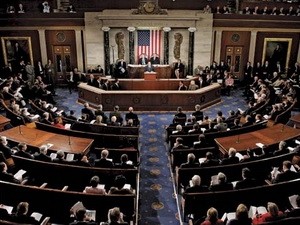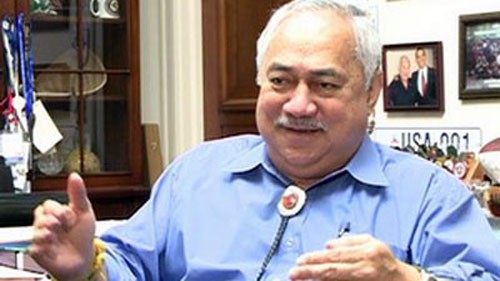(VOVworld)- On September 11, the US House of Representatives passed a bill called the Vietnam Human Rights Act of 2012 (H.R. 1410) calling on the government of Vietnam to respect human rights. This bill and an accompanying resolution H. Res 484 are based on erroneous and biased information about the protection of human rights in Vietnam and run counter to the interests of the Vietnamese and American people.
Initiated by US Senator Loretta Sanchez, House Resolution 484 slanders the Vietnamese government with restricting freedom of religion and detaining those who have different political opinions and those who are called moderate fighters for freedom of religion and politics. The bill HR 1410 written by Senator Chris Smith, enumerates the Vietnamese government’s alleged limitations of human rights, cuts non-charitable US aid for Vietnam unless Vietnam makes verifiable considerable progress in human rights protection. The resolution unreasonably asks Vietnam to make significant improvement to laws, which criminalize democratic activities and requires the US Secretary of State to regularly report any improvements of human rights in Vietnam.
 |
These bills run counter to the principle of respecting the national right of self-determination recognized by the UN Charter. The UN International Convention on Civil Rights and Politics stipulates that each nation has the right to choose its political institutions. The development and implementation of constitution and laws should be decided by each nation for itself without imposition by other countries or political forces. The Vietnamese people’s rights including the rights to freedom of speech, press, association and religion, are guaranteed by the Vietnamese constitution and laws. Vietnam actively protects these rights. The Vietnamese people are free to participate in the country’s political and social activities as well as contribute opinions to the Party and State on major issues facing the country. Vietnamese Deputy Foreign Minister Pham Quang Vinh, on the sidelines of a Conference on Vietnam’s implementation of the International Convention on Human rights said: "The Vietnamese Party and State always consider people a driving force and the goal throughout the development process and ensuring human rights and people’s democracy is the nature of our regime. In ensuring human rights, it’s important to expand the mechanism promoting democracy, improve the legal system, boost socio-economic, cultural and technological development and help Vietnamese people develop. These will serve as a foundation for the international community to better understand the Vietnamese State’s determination to ensure human rights. Inaccurate information about this reality should be rejected".
All Vietnamese citizens are free to be religious or non-religious. Religious followers and all religious organizations that are recognized by Vietnamese laws are free to conduct their religious activities according to legal regulations. This reality of freedom has been acknowledged by several American people and other foreigners, who have been to Vietnam. It has also been reflected in the UN Human Rights Council’s regular reviews on human rights. In Vietnam, there’s no such thing as religious or political prisoners. Those whom the US bills praise as fighters for human rights and democracy are violators of Vietnamese laws. The Vietnamese State’s punishment of those violators serves to maintain social and political security. In any country, acts that threaten the country’s fundamental interests are punishable by law.
It’s a pity that in a world where respect for independent sovereignty and non-intervention into each other’s internal affairs have become fundamental principles, the US House of Representatives has passed subjective, unjust, biased bills on human rights in Vietnam. Moreover, the association of these bills with aids for Vietnam runs counter to the interests of Vietnamese and American people.

US Congressman Eni Faleomavaega
|
US Congressman, Eni Faleomavaega, a member of the House Committee on Foreign Affairs, said: “I don’t agree with how some of my colleagues perceive human rights, in terms of how each country practices it, according to the values and the principles that they adhere to in their culture. I feel that the government of Vietnam is doing its best. I’m in reckon of opposing the action taken by my colleagues in criticizing human rights record of Vietnam for the simple reason that I don’t think the other side of the story is properly told”.
Vietnam and US have enjoyed improving relations in recent years. Both countries have regularly discussed issues of common concern, including human rights, in a spirit of frankness, constructiveness and mutual respect. This is the best way to increase mutual understanding and narrow differences, contributing to developing the two countries’ relations for the benefit of both sides.